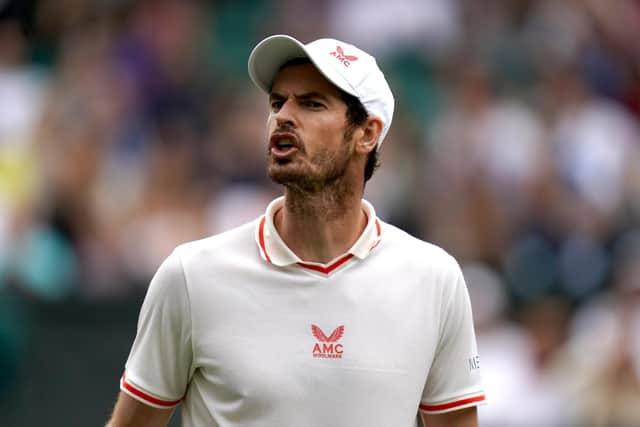Wimbledon ban on Russian players risks setting ominous precedent – Martyn McLaughlin
The debate over the ban on Russian and Belarusian players taking part at this summer’s event has been reignited after Sir Andy Murray was asked for his views on the issue. The two-time men’s singles champion said he did not agree with the move, but conceded that there was no “right answer”.
“I’m not supportive of players getting banned,” said the 34-year-old. “The guidance from the government was not helpful. My understanding of the guidance was that Russians and Belarusians can play if they sign a declaration that they’re against the war and against the Russian regime. I’m not sure how comfortable I would feel if something happened to one of the players or their families [as a consequence].”
Advertisement
Hide AdAdvertisement
Hide AdIn terms of sporting spectacle, the ban is undoubtedly a blow for those who had hoped to see the best tennis players in the world compete against one another in one of the sport’s showpiece gatherings.


World number two Daniil Medvedev and world number eight Andrey Rublev – who has spoken out against the war at great personal risk – will miss out on the men's side, with the likes of Anastasia Pavlyuchenkova and Daria Kasatkina – ranked 11th and 23rd respectively – will be absent from the women’s event.
The All England Lawn Tennis Club (AELTC) has said it consulted the UK Government prior to making its decision, and reasoned that it has a responsibility to “limit Russia’s global influence through the strongest means possible”.
It explained: “In the circumstances of such unjustified and unprecedented military aggression, it would be unacceptable for the Russian regime to derive any benefits from the involvement of Russian or Belarusian players.”
The AELTC’s statement rightly recognises that sport – and in particular, a tournament with the prestige and profile of Wimbledon – carries immense soft power, and it has made its decision with little in the way of precedent or rules to fall back on.
It also rightly acknowledges that all Russian and Belarusian athletes are highly visible representatives of their nations, irrespective of their own views about Vladimir Putin’s bloody war.
Even so, it is difficult to justify the ban. The most striking aspect of the AELTC’s statement is its own misguided sense of power. It would be naive in the extreme to expect Putin or any of his senior commanders to be rattled by its decision, especially when the stance it has adopted represents the exception rather than the norm.
The French Open, which is due to get underway next month, has yet to make its position on Russian and Belarusian players clear, but it is widely expected to allow them to compete under a regime of “strict neutrality” – meaning that there will be no flags or national anthems.
Advertisement
Hide AdAdvertisement
Hide AdThe ATP and the WTA, the governing bodies of both men’s and women’s professional tennis, have also been amongst the most vocal critics of the Wimbledon ban, with the former body said to be exploring some kind of ranking freeze to prevent those players excluded from the competition from being further disadvantaged.
As things stand, Russian and Belarusian players are still able to compete on the ATP and WTA tours as neutral athletes. For fairweather tennis fans who only tune in to major competitions one or twice a year, it is an extremely confusing situation. What exactly is the message being sent out when so many in the same sport are at odds with each other?
Sadly, tennis is not exceptional in its muddled and contradictory response to the grim events in Ukraine. The most obvious example is football, where Fifa and Uefa have suspended all Russian national and club teams from its competitions, yet prominent Russian players are still able to line up for clubs in other European leagues.
In the US, the National Hockey League (NHL) has ruled out the prospect of holding any competitions in Russia, and it has paused its business relationship with a major Russian sports betting company. Yet it continues to allow prominent Russian players to take to the ice.
They include the Washington Capitals’ Alex Ovechkin, widely regarded as one of the sport’s greatest goalscorers. He also happens to be a longstanding Putin supporter who in 2017 started a social media movement called Putin Team during the Russian president’s re-election campaign.
In light of all this, some might have a renewed respect for the decision-making which led to the AELTC’s unilateral ban. There is no doubt that officials would have been aware of how divisive the move was.
My hunch is that they felt compelled to act given the potentially nightmarish PR scenario of the Duchess of Cambridge being forced to present a trophy to Medvedev or Pavlyuchenkova. Is it cynical to suggest that there would have been no ban if every Russian and Belarusian player occupied the foothills of the world rankings?
Whatever your view on the AELTC’s ban, the fact that it is so contested and controversial seriously undermines its impact, even before the first ball has been hit in earnest.
Advertisement
Hide AdAdvertisement
Hide AdSome high-profile players have been parroting Kremlin talking points, arguing that the ban is discriminatory, and will only serve to damage the tournament itself.
It is, in short, something of a mess, and it raises the question of whether ominous precedents are being set. Will there be a time when Chinese gymnasts are asked to speak out against their country’s mistreatment of the Uyghurs before they can compete?
Whether we like it or not, sport is always political, and unlike other bodies, Wimbledon’s organisers have not shied away from that fact. For that, they deserve credit, but it does not automatically follow that they have done the right thing.
Comments
Want to join the conversation? Please or to comment on this article.
